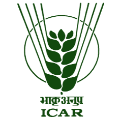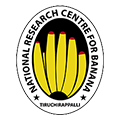ICAR - NRCB imparts training and Transfer of Technology to Nagaland Farmers and other Stakeholders on Hi-tech cultivation and value addition in banana
The ICAR - National Research Centre for Banana (ICAR–NRCB), Tiruchirappalli, organized a four-day (20-23 August, 2025) capacity building programme, training and transfer of technology for the government officials and farmers of Wokha District (under One District – One Product, MoFPI, GoI), Nagaland with the objective of strengthening knowledge and skills in hi-tech banana cultivation and banana-based value addition consequent upon the National Stakeholders Workshop and Panel discussion on ‘Strengthening Banana Ecosystem for Sustainable Development” held at Wokha Dt., Nagaland on 11th March 2025. The programme brought together experts from various disciplines of banana research and extension to provide practical training and technology demonstrations, enabling farmers to improve both productivity and profitability. The programme was sponsored by “ICAR – NRCB CRP on Vaccines and Diagnostics (NEH Component)”. A total of 19 including Project Manager & Skill Development Officer, ICAR-KVK SMS, Farmers, FPO and other stakeholders participated in the programme.
Inaugurating the training, Dr. R. Selvarajan, Director of ICAR–NRCB, highlighted the immense potential of banana as both a fresh fruit and a processed commodity. He stressed the need for farmers to adopt proven scientific innovations in cultivation and post-harvest management to ensure higher yields, reduced post-harvest losses, and new livelihood opportunities through value-added products. He also appreciated the enthusiasm of farmers from Nagaland for coming forward to adopt NRCB’s technologies.
During the training course theory and practical classes were taught on hi-tech banana cultivation practices, including drip-irrigation, automation, fertilizer and bunch management, which are essential for achieving higher productivity; the role of nutrient management in banana, with particular emphasis on the importance of micronutrients and the application of ‘Banana Shakti’ (a micronutrient mixture) for enhancing plant growth, yield and quality; sensitized the government schemes and policies available to farmers, helping them to access subsidies, credit support, and other incentives for adopting improved technologies; strategies for integrated pest and disease management, enabling farmers to control major pests and diseases in an eco-friendly and cost-effective manner; significance of soil health management and practical guidance on the application protocols for the Kaveri Microbial Consortium (biofertilizer), which improves soil fertility, nutrient availability, and crop resilience; viral diseases of banana and their management, equipping farmers with diagnostic skills and preventive measures to reduce crop losses.
Besides, special focus was given to value addition of banana. Hands-on sessions on the preparation of banana-based processed products, including low-fat banana chips, banana fig, and pickles from banana flower and stem, as a part of transfer of technology. MoUs were signed between ICAR-NRCB and Wokha District Administration, Nagaland for one technology and three value-added products viz., Kaveri Microbial Consortium, Low fat fortified & flavoured chips, Dehydrated / fortified / flavoured ripe banana fig and Low sodium banana based pickles (flower, central core stem and peel).
Farmers were trained on hygienic processing, packaging methods, shelf-life enhancement, and compliance with FSSAI regulations, ensuring that their products meet the food safety standards and fetch better prices in the market.
The programme combined classroom sessions with field demonstrations and practical exercises. Farmers were supplied with standard operating procedures (SOPs), training manuals, and product samples to facilitate immediate adoption of the technologies. Many participants expressed keen interest in starting small-scale enterprises using banana processing technologies alongside cultivation.
This training programme by ICAR–NRCB is expected to make a significant impact on the farming community of Wokha District by equipping them with modern cultivation practices and value-added processing methods. By bridging the gap between laboratory research and farm-level application, the initiative reaffirms NRCB’s commitment to enhancing farmers’ income and promoting sustainable banana production and value addition in the North Eastern region of India. Dr. R. Selvarajan and Dr. K. Nagendran acted as Course Directors and Dr. C. Karpagam, Dr. K.N. Shiva, Dr. P. Suresh Kumar, Dr. M. Loganathan and Dr. R. Sudha functioned as Course Coordinators of the programme.



